OSS del Milano
I've spent the last couple of days at OSS 2008, one of Europe's premier open source conferences. It's my first experience of an academic type conference; all of the speakers (most of which were either students or professors) had submitted ~5,000 word essays in support of their talks, and these were bound into a book presented on arrival.
The conference was dryer than other events I've been too. Most of the sessions were based on empirical studies and it seemed to me that several speakers were treating their study as an end in itself, rather than as a discipline with practical value. For instance, one presenter went to great pains to show that open source is growing quickly, and wanted to use mathematical models to predict how this trend would develop. Ignoring for one moment the flaw in this approach (the open source world and software industry are vulnerable to external forces; mathematical models won't work here), what's the point of trying to predict this stuff? I mean, it's vaguely interesting to know what the current health of the market is like, backing up what most people already know (is healthy, yes!), but trying to extrapolate this data into the future is pointless at best.
Anyway, rant over! There were some interesting insights in some of the other sessions. Many of the talks focused on how communities were structured, how they operate and how they're likely to evolve:
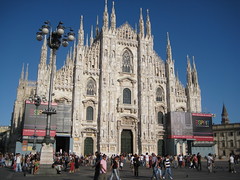
And you can clamber around on the roof!
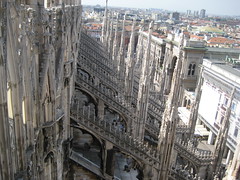

There's also an epic covered arcade called Galleria Vittorio Emanuele II:
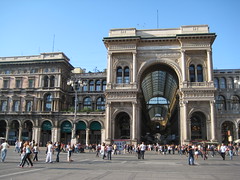
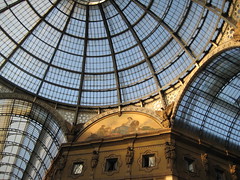
And the impressive Castello Sforzesco:
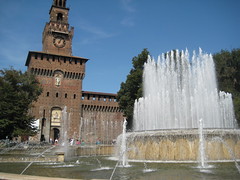
We found some unfortunate signs around the city...
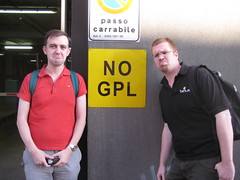
We had lovely pasta and pizza for most main meals, in charming family run restaurants:
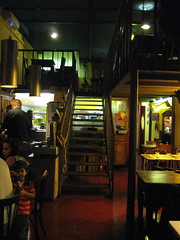
...but the desserts were the star of the show!
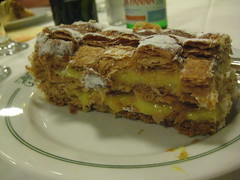
I missed out on eating Gelato, but you've got to leave something for next time, haven't you?
You can see the full set of photos on my Flickr page.
The conference was dryer than other events I've been too. Most of the sessions were based on empirical studies and it seemed to me that several speakers were treating their study as an end in itself, rather than as a discipline with practical value. For instance, one presenter went to great pains to show that open source is growing quickly, and wanted to use mathematical models to predict how this trend would develop. Ignoring for one moment the flaw in this approach (the open source world and software industry are vulnerable to external forces; mathematical models won't work here), what's the point of trying to predict this stuff? I mean, it's vaguely interesting to know what the current health of the market is like, backing up what most people already know (is healthy, yes!), but trying to extrapolate this data into the future is pointless at best.
Anyway, rant over! There were some interesting insights in some of the other sessions. Many of the talks focused on how communities were structured, how they operate and how they're likely to evolve:
- We learned about a project (Project Laika) which had bloomed and then declined, so plenty of lessons learned there. The main one was that they tried to fix everything that users asked for, rather than encouraging the community to get involved in the fixing, and this didn't scale.
- Walt Scacchi has observed that open source projects are changing as non-developers are getting involved, which obviously resonated with me. The folks who can mediate discussions between developers and non-developers become essential hubs in these new communities. Separately, Walt's also setting up a helpful repository for research papers.
- There was also a useful session on how trust is formed in open source projects. The conclusions were that new users approaching a project for the first time undertake a quick assessment based on reputation, number of downloads, amount of activity and longevity of the project. And as they get more involved in a project they focus more on openness of the whole development process (e.g. availability of bug tracking tools, documentations, etc.), the way builds are tested and integrated, availability of intermediate milestones and implementation processes. Faith in the system leads to trust, which leads to contribution.

And you can clamber around on the roof!


There's also an epic covered arcade called Galleria Vittorio Emanuele II:


And the impressive Castello Sforzesco:

We found some unfortunate signs around the city...

We had lovely pasta and pizza for most main meals, in charming family run restaurants:

...but the desserts were the star of the show!

I missed out on eating Gelato, but you've got to leave something for next time, haven't you?
You can see the full set of photos on my Flickr page.
Comments